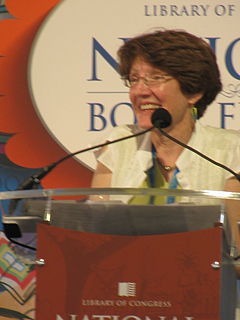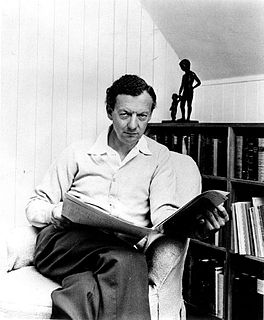A Quote by Cornelia Funke
What on earth have you packed in here? Bricks?" asked Mo as he carried Meggie's book-box out of the house. You're the one who says books have to be heavy because the whole world's inside them," said Meggie.
Related Quotes
The books in Mo and Meggie's house were stacked under tables, on chairs, in the corners of the rooms. There where books in the kitchen and books in the lavatory. Books on the TV set and in the closet, small piles of books, tall piles of books, books thick and thin, books old and new. They welcomed Meggie down to breakfast with invitingly opened pages; they kept boredom at bay when the weather was bad. And sometimes you fall over them.
Dustfinger inspected his reddened fingers and felt the taut skin. ‘He might tell me how my story ends,’ he murmured. Meggie looked at him in astonishment. ‘You mean you don’t know?’ Dustfinger smiled. Meggie still didn’t particularly like his smile. It seemed to appear only to hide something else. ‘What’s so unusual about that, princess?’ he asked quietly. ‘Do you know how your story ends?’ Meggie had no answer for that.
This world,' she said. 'Do you really like it?' What a question! Farid never asked himself such things. He was glad to be with Dustfinger again and didn't mind where that was. It's a cruel world, don't you think?' Meggie went on. 'Mo often told me I forget how cruel it is too easily.' With his burned fingers, Farid stroke her fair hair. It shone even in the dark. 'They're all cruel,' he said. 'The world I come from, the world you come from, and this one, too. Maybe the people don't see the cruelty in your world right away, it's better hidden, but it's there all the same.
So Mo began filling the silence with words. He lured them out of the pages as if they had only been waiting for his voice, words long and short, words sharp and soft, cooing, purring words. They danced through the room, painting stained glass pictures, tickling the skin. Even when Meggie nodded off she could still hear them, although Mo had closed the book long ago. Words that explained the world to her, its dark side and its light side, words that built a wall to keep out bad dreams. And not a single bad dream came over that wall for the rest of the night.
Meggie Folchart: Having writer's block? Maybe I can help. Fenoglio: Oh yes, that's right. You want to be a writer, don't you? Meggie Folchart: You say that as if it's a bad thing. Fenoglio: Oh no, it's just a lonely thing. Sometimes the world you create on the page seems more friendly and alive than the world you actually live in.
Because by now Elinor had understood this, too: A longing for books was nothing compared with what you could feel for human beings. The books told you about that feeling. The books spoke of love, and it was wonderful to listen to them, but they were no substitute for love itself. They couldn't kiss her like Meggie, they couldn't hug her like Resa, they couldn't laugh like Mortimer. Poor books, poor Elinor.
Desperate? So what? I'm desperate, too!" Fenoglio snapped at her. "My story is foundering in misfortune, and these hands here," he said holding them out to her, "don't want to write anymore! I'm afraid of words Meggie! 'Once they were like honey, now they're poison, pure poison! But what is a writer who doesn't love words anymore? What have I come to? This story is devouring me, crushing me, and I'm it's creator!
If you take a book with you on a journey," Mo had said when he put the first one in her box, "an odd thing happens: The book begins collecting your memories. And forever after you have only to open that book to be back where you first read it. It will all come into your mind with the very first words: the sights you saw in that place, what it smelled like, the ice cream you ate while you were reading it... yes, books are like flypaper—memories cling to the printed page better than anything else.
Sometimes I read the same books over and over and over. What's great about books is that the stuff inside doesn't change. People say you can't judge a book by its cover but that's not true because it says right on the cover what's inside. And no matter how many times you read that book the words and pictures don't change. You can open and close books a million times and they stay the same. They look the same. They say the same words. The charts and pictures are the same colors. Books are not like people. Books are safe.
Books, books, books! I had found the secret of a garret room Piled high with cases in my father’s name; Piled high, packed large,--where, creeping in and out Among the giant fossils of my past, Like some small nimble mouse between the ribs Of a mastodon, I nibbled here and there At this or that box, pulling through the gap, In heats of terror, haste, victorious joy, The first book first. And how I felt it beat Under my pillow, in the morning’s dark, An hour before the sun would let me read! My books!
What shop did this book come from? she asked. Her father was looking worried at the cooker. He always got rice wrong. I don't know, Brooksie, he said, I don't remember. That was unimaginable, not remembering where a book has come from! and where it was bought from! That was part of the whole history, the whole point, of any book that you owned! And when you picked it up later in the house at home, you knew, you just knew by looking and having it in your hand, where it came from and where you got it and when and why you'd decided to buy it.
Grampa took Mary Ellen inside away from the crowd. "Now, child, I am going to show you what my father showed me, and his father before," he said quietly. He spooned the honey onto the cover of one of her books. "Taste," he said, almost in a whisper. . . . "There is such sweetness inside of that book too!" he said thoughtfully. "Such things...adventure, knowledge and wisdom. But these things do not come easily. You have to pursue them. Just like we ran after the bees to find their tree, so you must also chase these things through the pages of a book!

























